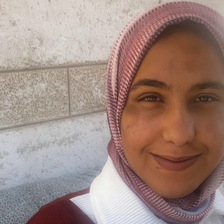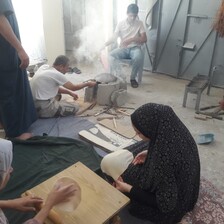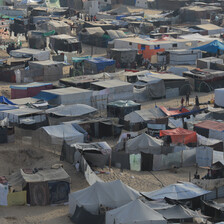The Electronic Intifada 3 July 2024

Palestinians live in makeshift tents at a camp in al-Zawaida, central Gaza Strip, 27 June.
APA imagesBefore this war, I lived in a three-story house with my family. Our house was large and spacious, with a big kitchen and the entire first floor for hosting visitors.
I had rejected the idea of living in a tent. I felt that it would never come to that for me – my economic and social circumstances would never allow it.
However, it happened.
I had no place else to go. I have now lived in a tent since 12 May, after the Israelis invaded Rafah.
I tried to lie to myself and imagine it as a camping trip. Something temporary and novel. But it’s nothing like that.
Sand gets everywhere
Looking at a tent from the outside is different from living inside it.
During the day, it’s sweltering, and the air inside is suffocating. I can’t keep the door-flap of the tent open widely to refresh the air because there are tents around us and people move around at all hours, to the kitchen or to the bathroom.
There is no privacy. I can hear all the conversations from every direction.
From 10 am to 3 pm, we are cooked inside the hot walls, and my son Majid sometimes showers multiple times to stay cool.
At night, though, it’s cold and windy and we need thick blankets to stay warm.
The biggest tent in our encampment is still small compared to any home. Every room of the house is now one room in the tent.
Sand gets everywhere, in our blankets, our pillows, our clothes. I sweep the tent several times a day, but it’s never enough. I wash Majid’s hands and legs constantly, to keep the sand away.
The tent is on uneven, non-leveled ground. One night Majid migrated from one end of the tent to another while sleeping, like a slide. The winds also move the tent, and my brother and uncles have to re-stake the walls to keep it in place.
Each morning the dew collects in the tarp and falls like rain. It soaks everything in water, but we’ve added more layers to the outside of the tent to keep us dry.
Without solar cells, we have nothing
In the west of Khan Younis, where our tent is, there are various types of tents but few homes remaining.
The Israeli occupation forces decimated Khan Younis in their invasion, leaving most neighborhoods as piles of rubble.
There are 41 of us in our camp, and we share four bathrooms.
In the morning and after lunch, the bathrooms are crowded. Then, at night, it is terrifying to walk alone between the tents to the bathroom. I once found a dog roaming in our camp. Another time, I heard a plane directly above the bathroom. I turned off the light and stayed still until it passed.
Since we are all displaced and jobless in the camp, we measure our living standards by other metrics, like who has the biggest tent and who has solar cells.
Our camp is located on the land of a farmer named Abu Hosni. He has more than 15 solar cells and he uses them to pump water for us, to charge our phone and batteries and to keep our food cool.
It’s difficult to buy a solar cell, as it now costs around $1,000 as opposed to $150 before the war. But it’s the only way we can get electricity, and it will likely be that way far into the future.
For the displaced who do not have access to solar cells and water pumps, they must wait in line for hours with their water barrels and pay what little money they have to get water from a community pump.
Our fates altered
Before the war, my closet was full of all types of clothes in different styles and colors. But I now only have two outfits, and most of the days I wear what all the rest of the women and girls wear, the outfits that we would typically wear to prayers.
Now our clothes smell like fire from cooking, and it’s difficult to remove the scent since washing water is rationed.
The internet connection is very weak. Though the card I bought is for four hours, it really only works for one hour. I can barely read the news or talk to friends. My husband is in the north and last month I could only talk to him once or twice because of the poor connection.
All of our fates have been altered. My 17-year-old cousin sells shampoo and soap to provide for his family, whose home was bombed and destroyed by Israel.
He encouraged my young brothers Amro, 16, and Yazan, 14, to also sell things to make money. So they bought some candies, Nescafé, jams and noodles to sell.
They’re supposed to be in school, not selling wares on the streets.
But there are no real markets near here and I have to either walk for an hour or find a donkey cart to reach what used to be the central market.
Everything is lacking here, except death and fear.
The sea is a comfort
I often hear the sounds of Israeli bombs being dropped and artillery being fired. Our tent vibrates and shakes. With no walls to protect us – and even then, what protection do walls offer? – we feel no sense of security.
Our walls and ceilings are mere tarp and cloth, so easily penetrated and burnt.
The sea is nearby. And even though it’s also a site of Israeli aggression, it still seems to me a symbol of freedom and comfort.
When I feel depressed, confused or suffocated, I take my son to the sea.
The beach is crowded with displaced people now, washing their dishes and bathing. But here, at least, people can escape from the heat and the pressure.
I talk with the sea about everything that upsets me. Then I hug my son, hide my tears and return to the tent that I now call home.
Hanin A. Elholy is a researcher, writer and translator based in Gaza.





